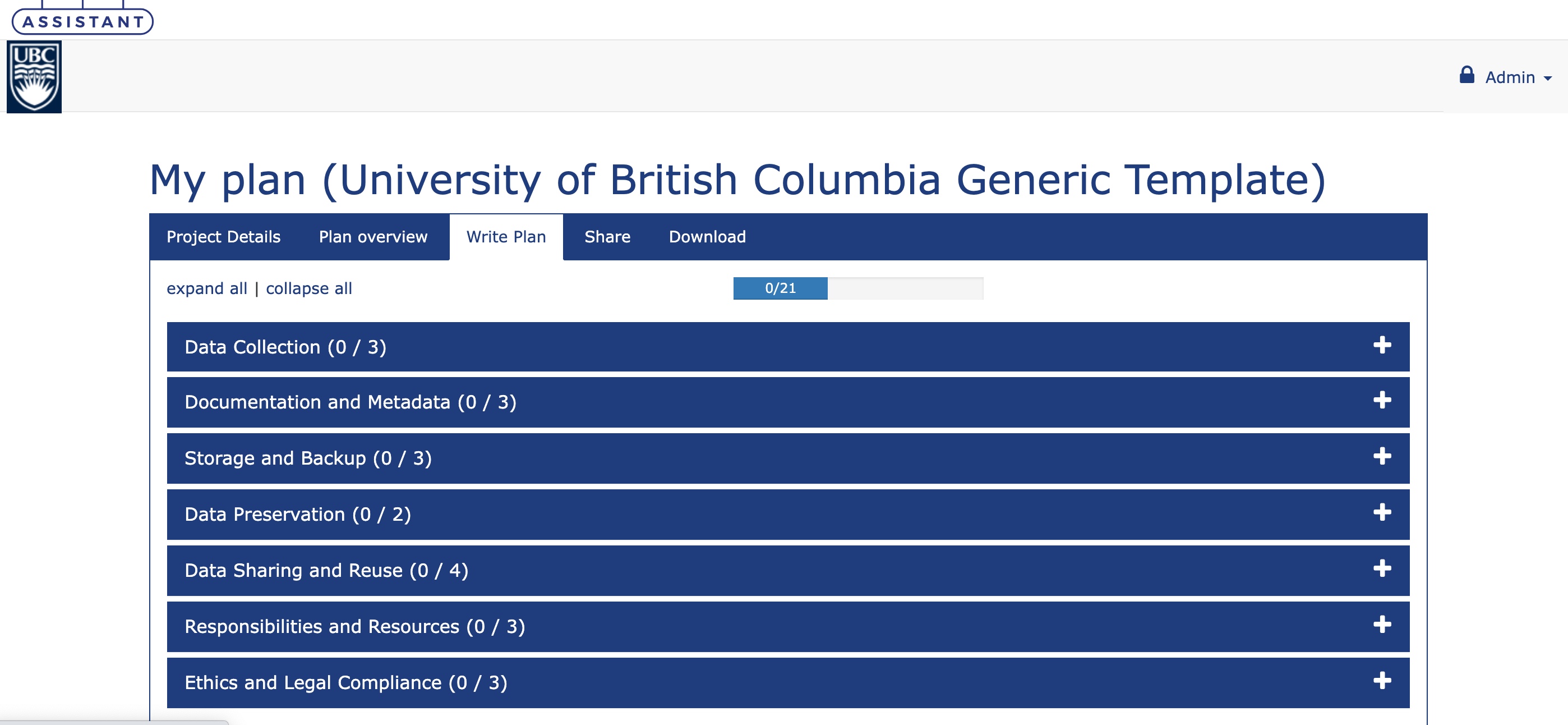Table of contents
Looking for a cheat sheet? Check out our one-pager!
Why Create DMPs?
A Data Management Plan (DMP) is a short, formal document which clearly articulates the strategies and tools you will implement to effectively manage your data. The objective of a DMP is to address issues related to data management at the very beginning, when you are starting your research project. It speaks to the management of data both during the active phases of your research and after the completion of the research project.

The Tri-Agency Research Data Management Policy states that: “All grant proposals submitted to the agencies should include methodologies that reflect best practices in RDM (Research Data Management). For certain funding opportunities (listed below), the agencies will require data management plans (DMPs) to be submitted to the appropriate agency at the time of application, as outlined in the call for proposals; in these cases, the DMPs will be considered in the adjudication process.”
Funding requiring DMPs

So far, we are seeing the following funding opportunities requiring DMPs, in addition to all CFI (Canada Foundation for Innovation) applications:
CIHR
- Network Grants in Skin Health, Bone Health and Muscular Dystrophy (October 2022)
- Team Grants: Strengthening the Health Workforce for System Transformation (June 2023)
- Team Grants: Lung Health (July 2023)
- Operating Grant: Clinical Trials Projects (July 2023)
- Team Grants: Improving Health and Administrative Data and Monitoring for Rare Diseases (August 2023)
- Operating Grant: Addressing Infectious and Congenital Syphilis in Canada (September 2023)
- Canadian Consortium on Neurodegeneration in Aging (September 2023)
- Team Grants: Embracing Diversity to Achieve Precision and Health Equity (October 2023)
- Canadian Immunization Research Network (CIRN) renewal (November 2023)
- Team Grant: HIV/AIDS and STBBI Community-Based Research (December 2023)
- Team Grant: Biomedical Research for HIV/AIDS and STBBI (April 2024)
- Canadian Consortium on Neurodegeneration in Aging Phase III: Research Teams (August 2024)
- Operating Grant: HCRI—Data Analysis Using Existing Databases and Cohorts (May 2024)
- Team Grant: Bringing Biology to Cancer Prevention (forthcoming)
- Team Grant: Pan-Canadian Network: Emerging Learning Health System in Perinatal Mental Health
NSERC
- Subatomic Physics Discovery Grants - Individual and Project (November 2023)
- NSERC - ECCC Call for Proposals on Plastics Science and Innovation for a Cleaner and More Sustainable Future (May 2025)
- Alliance Society (September 2025)
SHHRC
- Partnership Grants Stage 2 (October 2023)
- Policy Innovation Partnership Grants (September 2025)
General Notes for DMP creation
- Use your UBC CWL to log in (as of October 2024). If your account was created before, you can link it with your CWL (Login with your older account, click on your name in the top right > Edit Profile > Institutional credentials > choose University of British Columbia
- When creating your research project’s DMP, it’s important to begin with a general description that outlines the project’s focus and purpose.
- Keep in mind that the DMP should be easily understood by anyone, so try to avoid using excessive discipline-specific jargon.
- If you do need to use acronyms, be sure to define them for clarity.
- Not all sections or questions in the DMP may be applicable to your specific project, so feel free to leave them blank if necessary.
- Additionally, consider including ORCIDs (Open Researcher and Contributor IDs) for the researchers involved. ORCIDs provide metadata that ensures appropriate academic credits are attributed.
Remember that your DMP is a living document that should be developed at the very beginning in the research process and regularly updated as needed, similar to your README file and data dictionary.
Tools to Create DMPs
DMP Assistant in Canada
To create your DMP, please use DMP Assistant.
This is a free, open-source Canadian tool created by the Portage network (now The Digital Research Alliance of Canada) for preparing DMPs. It is available in both English and French and allows you to create and export your DMP.
UBC has a simplified and a comprehensive template for UBC researchers. This tool follows best practices in data stewardship and walks researchers step-by-step through key questions about data management.

DMP Assistant is designed to meet the requirements of these Canadian funders:
- Canada Foundation for Innovation (CFI)
- Canadian Institutes of Health Research (CIHR)
- Natural Sciences and Engineering Research Council (NSERC)
- Social Sciences and Humanities Research Council (SSHRC)
The Portage community and the Alliance community have also collaborated on some excellent exemplars. These exemplars cover a range of disciplines and research methods, highlight best practices for DMPs in those disciplines, and provide a reference point for researchers writing their own DMPs.
Other tools
In the United States, the University of California maintains DMP Tool, and the Digital Curation Centre in the UK maintains DMP Online. Each of these tools functions similarly (in fact we all share the same code base) by walking you through the process of writing a DMP.
Key Components
These key components should be considered to create a meaningful DMP:
- Data Collection
- Documentation and Metadata
- Storage, Backup, and Data Access Management
- Deposit, Reuse, Preservation
- Responsibilities and Resources
- Ethics and Legal Compliance
Need help?
Please reach out to research.data@ubc.ca for assistance with any of your research data questions.
Loading last updated date...